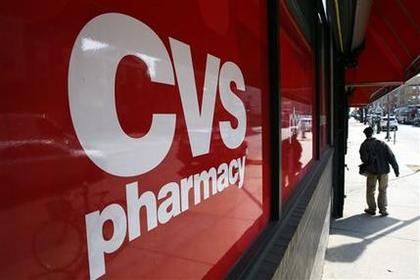 CVS Health’s fourth-quarter profit rose 13 percent, as acquisition gains helped the drugstore operator and pharmacy benefits manager meet Wall Street’s earnings expectations.
CVS Health’s fourth-quarter profit rose 13 percent, as acquisition gains helped the drugstore operator and pharmacy benefits manager meet Wall Street’s earnings expectations.The Woonsocket, Rhode Island, company said its $10-billion acquisition of pharmaceutical distributor Omnicare helped increase revenue in both its main businesses. That deal, which closed last summer, gave CVS Health national reach in dispensing prescription drugs to assisted living and skilled nursing homes, long-term care facilities, hospitals and other care providers.
CVS Health earned nearly $1.5 billion in the final quarter of 2015. That’s up from $1.32 billion in the last quarter of 2014. Adjusted results totaled $1.53 in the most recent quarter. Revenue climbed 11 percent to $41.15 billion.
Analysts expected, on average, earnings of $1.53 per share on $41.02 billion in revenue, according to Zacks Investment Research.
CVS Health Corp. runs the nation’s second-largest chain of drugstores and one of the biggest pharmacy benefits management operations. The company pulls most of its revenue from that PBM segment, which runs prescription drug plans for customers like insurers and employers.
CVS Health said revenue from that segment grew 11 percent in the fourth quarter to $26.5 billion, with growth in specialty drugs also helping its performance. Specialty drugs are very expensive, usually injected, drugs for complex chronic health conditions – a category that is driving up overall spending on medications.
The company also booked $20 million in acquisition-related charges in the quarter. Some of that came from the Omnicare deal and CVS Health’s acquisition of the pharmacy and clinics business of big retailer Target Corp.
CVS Health said in December that it had closed that $1.9 billion deal. Last week, the companies said they had opened the first of their integrated stores in North Carolina, and they will rebrand Target’s 1,672 pharmacies over the next six to eight months.
The deal gives East Coast-centric CVS Health a presence in several markets west of the Mississippi, including Seattle, Denver and Portland. The company will now have a presence in every state except Wyoming.
Counting the Target pharmacies, CVS Health operated 9,655 retail locations at the end of 2015, a total that includes sites in Puerto Rico and Brazil. That trails Walgreens Boots Alliance Inc., which runs more than 13,000 locations globally and is in the process of acquiring Rite Aid Corp., the nation’s third largest drugstore chain.
CVS Health on Tuesday also affirmed a forecast it laid out in December for 2016 adjusted earnings of between $5.73 and $5.88 per share.
Analysts expect, on average, earnings of $5.82 per share, according to FactSet.
The company also expects first-quarter adjusted earnings to range between $1.14 and $1.17 per share, which falls a penny below average Wall Street expectations.
The company has said acquisitions and other business gains will improve revenue this year, but it will take a few months for that to reach the bottom line. The company expects earnings growth to pick up more in the second half of next year.
Shares of CVS Health fell $1.65, or 1.8 percent, to $88 in premarket trading Tuesday, about 45 minutes before markets opened.
That stock has dropped slightly more than 8 percent since the beginning of the year, while the Standard & Poor’s 500 index has declined slightly more than 9 percent. The stock has dropped 11 percent in the last 12 months.
Source: Associated Press
Filed Under: Drug Discovery




